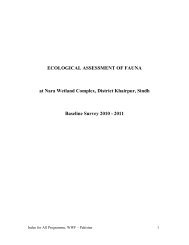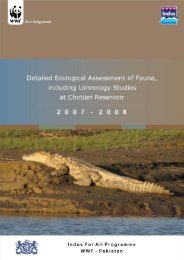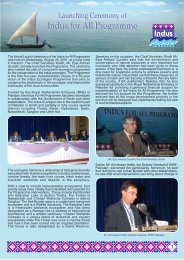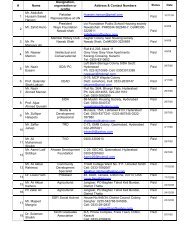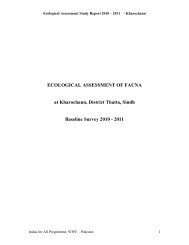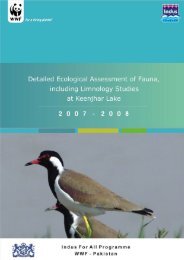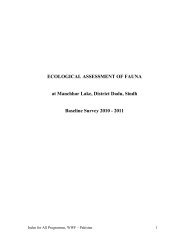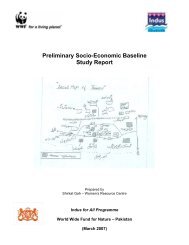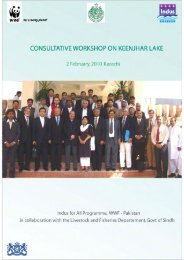Disclaimer note - WWF - Pakistan
Disclaimer note - WWF - Pakistan
Disclaimer note - WWF - Pakistan
Create successful ePaper yourself
Turn your PDF publications into a flip-book with our unique Google optimized e-Paper software.
Detailed Ecological Assessment Report 2008 – Keenjhar Lake<br />
In addition the boats may be, particularly if large, be “owned” by a group of<br />
investors, who also receive a portion of the catch. One may own the hull, another<br />
engine, and yet another net. The division of the proceeds of the catch after<br />
repayments is in Keti Bandar) reported to be:-<br />
• Net – 6 shares (“patti” or “pati”)<br />
• Boat – 2 shares<br />
• Engine – 6 shares<br />
• Owner – 1 share<br />
• Khalasi – 1 share (crew/labor)<br />
Similarly, and illustrating the variety of systems, the shares after an 8 day trip are<br />
also described as being fivefold with two shares to the boat owner, and 3 to the<br />
crew, the catch being owned by the middleman. Another variation, reported by<br />
Sindh Forest and Wildlife Department 30 in 1999 for large gill-netters and trawlers<br />
of 9 to 15 m length with 6 to 15 crew was:-<br />
• Engine owner – 2 patis<br />
• Net owner – 2 patis<br />
• Boat owner – 1 patis<br />
• Driver/captain – 1.5 patis<br />
• Crew – patis divided equally<br />
The same reference comments that on larger trawlers and gill-netters there is a<br />
system of at least 60 pattis (shares) with 50% to the owner, 6 patis to the captain<br />
and his assistants and the rest divided equally among the crew.<br />
In short the system of dividing up the catch proceeds amongst the crew is varied.<br />
Fishermen report being harassed by customs officials, the coastguard, the navy,<br />
American Naval boats undertaking anti terrorist operations and the Karachi Port<br />
Trust. These organizations merely add to their problems.<br />
3.5.8.7 The contract system<br />
The contract system was introduced in Badin District on the inland sea in 1977<br />
and was intended to cover the areas close to the Indian Border. It expanded until<br />
it covered large tracts of land and many water bodies, some in Thatta. Under the<br />
contract system the fishermen were obliged to sell their catch to powerful men<br />
who had bought contracts from the Rangers. The Rangers were meant to pay for<br />
their rights to the Sindh Fisheries Department, but apparently did not. Contractors<br />
paid as little as 7% of the retail value of the product (usually small shrimp). The<br />
Rangers enforced the system. This system was seen a very unjust and following<br />
agitation by the <strong>Pakistan</strong> Fisherfolk Forum the system was abolished in 2005. It<br />
has been replaced by a license system, and it remains to be seen how many of<br />
the existing fishermen will obtain licenses, and to what degree their situation will<br />
be alleviated.<br />
3.5.8.8 Tuna fisheries<br />
Along the coast of <strong>Pakistan</strong> a very specific established commercial Tuna fishery<br />
exists the species belong to genus Thunnus of the family Scombridae. Tuna are<br />
great in demand in the world markets. Tuna fishery is exploited both from coastal<br />
waters and from off shore waters. In the coastal waters local boats operate with<br />
long lines and off shore fishing is mainly permitted to Chinese and Vietnamese<br />
factory ships. Locally caught species are Thunnus tonggoi, Tuna nei and<br />
Scomberomorues sp. Associated with the tuna species the local fishermen catch<br />
<strong>WWF</strong> <strong>Pakistan</strong> – Indus for All Programme Page 84 of 188



